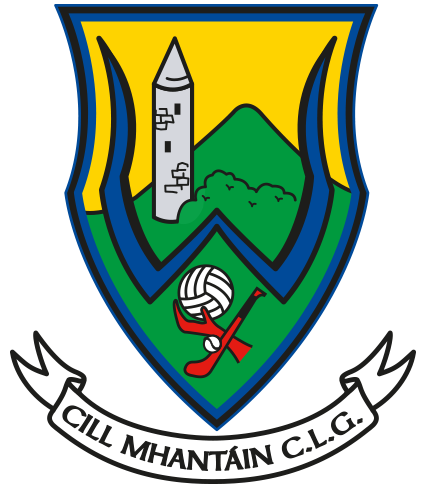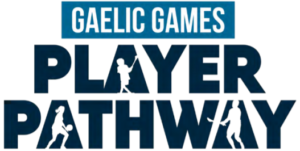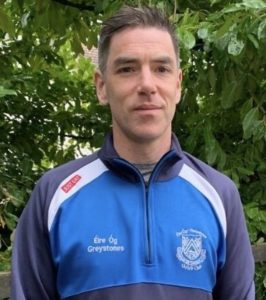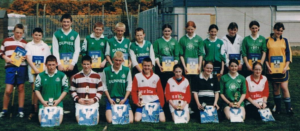Wicklow GAA ‘COACH NEWS’ Week 9
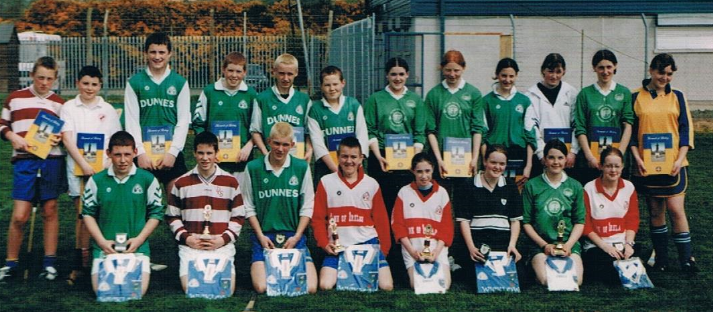
YES, it’s great to be back in club’s grounds again after the latest lockdown. Clubs and coaches were very busy over the past week setting up their Parent What’s app groups and organising and planning Coaching sessions and booking time slots with their pitch coordinator for an action packed return to play. The GAA return to play information document should at this stage be circulated to all clubs, coaches and parents. Some of the KEY information supplied in this document are highlighted below for reinforcement purposes with the Key control measures remain completion of the online education module and completion of the Health Questionnaire before each session. This Plan reflects what activity is permitted to take place under Coaching & Games Development during Level 5 restrictions.
Advice:
Having the opportunity to reconnect with our young players gives coaches the freedom to ease our young players back into a structured training programme. The next few weeks are important as we prepare our players for a safe return to official games programme. The sessions have all got to be fun based and include mini games. Make their experience even more enjoyable than before this is important for making that reconnection. It’s all about the number of ball/sliotar contacts that will help them develop their skills straight away while improving their fitness. As coaches lets be patient and realise how long we all have been away from the game. You are not going to get everything done in one or two sessions. Even through our young players will be all bursting with energy and enthusiasm it’s important that proper session planning is in place for these first few weeks back. It’s important to connect with the player before we start to correcting or fixing the skill element during the session. So as coaches don’t be overly concerned about skills or fitness as every child in every club right around the county will be experiencing the same situation right now. Over the course of a number of sessions you will see visible improvement but this just can’t happen straight away. Then you can introduce skill challenges gradually as the weeks go by and bring more intensity to the session. Equipment is key, having loads of footballs/Sliotars at your disposal will help and increase enjoyment greatly and will eliminate big lines or queues. From a coach’s perspective lets acknowledge all the player’s efforts as this can instil a sense of value and worth to the group. Finally, some of your players will have developed over the last 6 months and just because the might have got bigger in appearance all activities planned must be age related. As coaches enjoy the planning, organising and conducting the sessions because it’s been a long time coming.
INFORMATION FOR CLUBS – Returning to training
Attendance at Training
In general, only players and coaches of the relevant team should attend any training session. One Parent or Guardian per child (or per family if more than one child is attending from a particular family) is permitted to attend in a safeguarding /supervisory capacity involving any team in the U-18 or below age group, should they consider it necessary. However strict social distancing and public health guidelines should be adhered to at all times. In particular, it is important that parents do not congregate in groups before or after sessions, outside of what is permitted in current Government regulations.
Any person wishing to attend our underage training or games including coaches, parents, players and spectators shall be subject to the provisions of the Code of Behaviour (Underage).
Covid Supervisors for Gaelic Games
Each Club Secretary and Chairperson (or their nominees) must have completed the online module at some point in the last 12 months so that each Club understands both the Role and the purpose of Covid Supervisors.
Every team in the club must have someone nominated with responsibility for Covid Supervision present at each training session or game. These nominees must complete the online module which outlines their exact role. Covid Supervisors will be on duty and will be clearly identifiable (for example, standardized bib) at all times while facilities are open until further notice
Broadly speaking the main duties of the Covid Supervisor for a team will include:
- Ensuring players and backroom personnel complete the Health Questionnaire before each game and training session.
- Ensuring sanitising of facilities is completed before and after each training session or game (e.g. Toilets, door handles, equipment )
- Maintaining records of attendees (if players are completing the online Questionnaire, this will occur automatically the system)
Education:
All Players (parents or guardians in the case of underage players) should ensure they have completed the Gaelic Games online education module in the last 12 months. The site can be access through the learning.gaa.ie/covid19
The Health Questionnaire:
Prior to commencing training players and support staff will complete a standard risk assessment health questionnaire before their initial return to training “Health Questionnaire”. The online version of this can be accessed through the Foireann Return to Play IT portal on www. foireann.ie. In the case of underage players, the questionnaire should be completed (or signed) by a parent or guardian.
Temperature checking:
It is the responsibility of the individual to monitor their own temperature. The presence of symptoms such as a high temperature (above 37.5c), cough, sore throat, general weakness, shortness of breath and change or absence in taste or smell prevents attendance at training with a recommendation that the player contacts their general practitioner and does not attend the GAA Facilities for training or games.
Sanitising of facilities:
At the end of each training session, the Covid Supervisor should ensure all door handles, playing equipment (e.g. balls, Hurley’s, Sliotars etc.), the medical room and the Toilet(s) are sanitised before use by the next team or training group
Attendance records/data management
The Covid Supervisor will ensure that the record of everybody attending each training session will be available in the event that contact tracing or other intervention is required. Data management will be consistent with GDPR guidelines.
Scheduling of Activities
Timesheets should be used to clearly show what teams are using club facilities at what times. The principle of “get in, train and get out” will apply. There should be a time interval between teams departing having completed training and the next team arriving. Attendance will be limited to essential personnel.
Compliance will be necessary to ensure efficiency and harmony.
All facilities should have appropriate dispersion measures in place at all entrances and exits and parents/guardians should be advised that there should be no congregation on or outside club grounds.
Education of club members
Covid Supervisors will have a role in conveying and explaining policy decisions and guidelines from the Gaelic Games Governing Bodies. As Government regulations change, the Gaelic Games Covid Advisory Group will issue communications detailing the consequences of any changes for our games or training sessions. It is important that each Club ensure these communications are shared as widely as possible within their Clubs.
Protocol for Participation
Players and team personnel should be provided with this document and have completed the Gaelic Games online education module within the last 12 months prior to participation. Participants are also required to change at home, travel separately (except family members), shower at home and where possible use toilet facilities at home. Strapping should be applied at home where possible. All players should use their own individual and clearly labelled water bottles.
INFORMATION FOR PLAYERS AND TEAM PERSONNEL
Education & Awareness:
- Completion of the Gaelic Games online education module through the GAA eLearning platform
- Continued awareness of safety protocols relating to your role as a player, coach or
Pre-Attendance Screening
All players and personnel will be required to comply with the following requirements if they are going to attend training or games until further notice:
- Complete the health questionnaire before each training session or game – this can be completed online. This will require you to identify if you have any symptom(s) – the presence of symptoms such as a high temperature (above 37.5c), cough, shortness of breath and change or absence in taste or smell prevents attendance with a recommendation that the player contacts their general practitioner. The form can be completed on line preferably but can also be completed in hard copy, in which case it should be presented to the Covid Supervisor on entry to the facility.
- If a player/member develops symptoms of COVID-19 (Coronavirus), the player should not attend a training session, skills practice session or game, and will need to self-isolate immediately and phone their GP for medical advice. The player should not attend the medical practice or surgery of their doctor, or pharmacy, healthcare clinic or
The doctor will evaluate the symptoms over the telephone and provide the necessary medical advice
Adhere to hygiene best practice.
- Frequent hand washing, sanitising, and regular cleaning and washing of gear and
- Avoid the following: spitting, sharing water bottles, touching high contact surfaces (e.g. door handles)
- Use of face masks where applicable
Observe Government advised social distance guidelines (currently 2m) until further notice
Avoid or Reduce body contact to a minimum.
- Shaking hands, clapping hands, ‘high fives’ and embracing should be completely avoided
- Until measures are reduced, physical contact should be reduced where possible on field. Off field, players should observe government social distancing guidelines at all times.
Ensure sessions take place outdoors:
- All Players and Teams must conduct their training sessions outdoors; dressing rooms, showers, clubhouses and other club buildings should remain closed until further
- Toilets will be available on a controlled
Travel to and from training
Follow Government social distancing advice in relation to all forms of transport to training and play.
- If possible, walk or cycle to the
- If travelling by private vehicle, such as a car, only travel with members of the same
- Avoid the use of public transport where possible (if it is the only option, follow Government guidelines)
Refrain from events such as team meetings
Eliminate all non-essential gatherings and put robust control measures in place for essential interaction.
- Team meetings can only be held outdoors or in spaces that allow for compliance with Government social distancing guidelines (currently 2 metres)
- All other meetings should be held online
Avoid Congregating before or after sessions
· All facilities should have appropriate dispersion measures in place at all entrances and exits and parents/guardians should be advised that there should be no congregation on or outside club grounds
WHAT COACHING & GAMES DEVELOPMENT ACTIVITY IS PERMITTED TO TAKE PLACE UNDER CURRENT GUIDELINES:
· Non-contact training in Pods of 15 for juvenile club teams in the 26 counties.
· Full squad training for youth & adult teams in the 6 counties. Please see page 7 for further details on return to squad training and competitive games in the Six Counties.
· Coach, Referee and Safeguarding Training courses are not permitted to take place either indoors or outdoors, but can still continue to be delivered online where applicable.
Please note the following Child Safeguarding Ratio’s apply:
· SUPERVISION RATIOS: Playing and training activities must abide by a minimum ratio of 2 adults to 10 children, (2:10).
· This ratio requires at least one qualified coach and at least one other responsible adult to be present at all times
· Groups of 10-20 children must have a minimum of 3 adults present at all times
The Gaelic Games Player Pathway – 3 Key Player Development Strands continued…
THE ENVIRONMENT
Whilst the central focus of the Gaelic Games Player Pathway is on the player, it is crucial that the environment around the player supports their development. It is also inclusive of our clubs, our schools, our colleges and our player development/academy/ county squads. As seen in the consultation process throughout the Talent Academy and Player Development Review process, aligning stakeholders and the various domains (i.e. clubs, schools and county) has proven to be very difficult. Through new coach education opportunities, coaches will develop an approach that has commonality everywhere. These opportunities will allow coaches to become creative and facilitate learning within their own context and the context of their players. Similarly, a shared understanding will be developed amongst other key people such as parents, teachers and administrators. This level of understanding is supported by an appropriate games programme and governance level i.e. The Gaelic Games System. The following are the 6 key pillars within the Environment strand of the Gaelic Games Player Pathway:
- Coaches
- Teachers
- Families
- Role Models & Peers
- The Games Programme
- The Gaelic Games System
Easter Skill Competition Winners:
Congratulations to Yasmin Bishop age 12 and Senna Bishop Aged 8 from Ashford GAA club who both won Wicklow GAA Jerseys in our East Skills Competition.
Ready to Play Webinar
Title: “Coach reflection and player-centred coaching: Implications for Players & Coaches”
Presenters: Richard Bowles & Anne O`Dwyer
Date & Time: Tuesday April 27thth at 7pm
Link: https://bit.ly/3u49YCQ
Registration for the ‘Be Ready to Play’ Athletic Development programmes is and remains open and coaches and players can be continuously encouraged to register through the GAA eLearning site https://learning.gaa.ie/bereadytoplay.
Quote of the week:
“If we were supposed to talk more than we listen we would have two mouths and one ear.”
– Mark Twain
Three Weekly Coaching Tips:
- Have fun – life is short enjoyment is the Key to learning
- It’s easy to coach players when they are performing well. Do you have the ability to help players (and yourself) deal with the tough times?
- Focus on the long term even when trying to achieve in the short term.
You can contact us:
We also invite emails from Wicklow People readers/coaches if they would like any topic or area covered in more detail in our “Coach’s News” section. Coaches can email their queries and questions to hugh.kenny.gamesmanager.wicklow@gaa.ie and we can address them by providing the relevant information each week
15 Coach Profile Questions
Name: Mark Donnelly
Club: Eire Og Greystones
Age Group You Coach: u13s and Academy
- Would you change any of the GAA Playing Rules?
In hurling I’d award two points for a side-line cut over the bar, it’s an incredible skill
- Why did you get involved in coaching?
My son Sean was starting off and I got pulled in from the side-lines
- What is the most rewarding element of being a coach?
Seeing the players enjoying themselves
- What advice would you give to young players?
Don’t be afraid to make mistakes and practice the skills at home
- What resources do you use to assist you in your role?
Paul Kilgannon’s books are great. Dublin GAA put out a book called ‘Give Us A Game’ which is full of training games. I follow the likes of Colm Nally (Meath coach), Barry Mullane (@coaching_active) and Tom Fitzgerald GDA (@pookiefitz) on twitter and get lots of ideas from them
- What does success look like to you?
Beating Kilcoole and Bray Emmets! Only joking, success is seeing the young player’s skills improve each year
- What do you see as your three main responsibilities as a coach?
- Making sure the players are enjoying training and matches
- Teaching the skills
- Providing encouragement
- How important is winning to you? why?
Winning does increase the player’s self-esteem and gives them confidence however at underage I don’t put much emphasis on winning, at that age skill development and all players getting equal playing time is more important.
- You have 10 footballs & 10 cones in your coaching kit bag. You are in charge of 30 players how would you conduct training to maximise all equipment & player involvement?
3 squares with 10 players to each square, put 3/4 players on corner of each square and have them doing 2 mins of picks up, 2 mins of handpassing, 2 mins of kicking, 2 mins of chest catch, 2 mins of high catch – then into 3 5-a-side games, swap teams after 10 mins
- What part of training or games do you dislike the most?
One sided games when winning or losing, everyone (kids included) enjoy competitive games
- What does a normal coaching week look like for you and the team?
Training Monday evening, match Wednesday and training again Saturday mornings. Lots of time outside of that organising matches, equipment, pumping footballs, booking training slots, washing jerseys, doing courses
- Why is planning your coaching sessions so important?
Going in with no plan always leads to poor sessions, best to have a plan focusing on areas that need work
- Why is feedback so important to player development?
I still remember feedback I got as a young lad, the players respond to encouraging feedback
- If one of your players are constantly overplaying the ball how do you get the player to correct this?
In training put in a rule like only one bounce, one solo to encourage heads up and seeing the options
- Explain how you have kept up to date with coaching methodologies and tactics?
I’ve done Award One coaching course and attend coaching webinars, Martin Fogarty’s regular hurling webinars are a great source of information. Also the GAA coaching site and twitter
